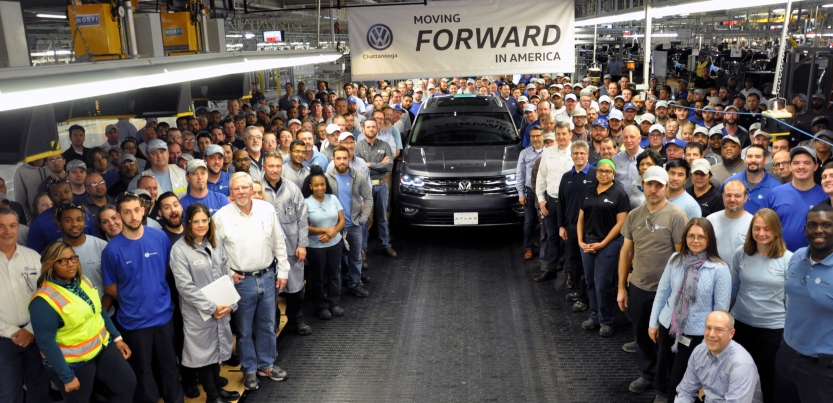Two years ago the Auto Workers (UAW) broke new ground when skilled-trades workers at the Chattanooga Volkswagen plant voted 108 to 44 in favor of unionizing.
It was the union’s first victory at a foreign-owned automaker in the U.S. South.
But the success was short-lived. The UAW went on to suffer several high-profile losses, including at Nissanand Fuyao last year.
But now, even that small victory at Volkswagen is likely to be stripped from the union by the D.C. Circuit Court and Trump-stacked National Labor Relations Board.
VOLKSWAGEN STALLS
Only 162 skilled-trades workers in the maintenance department at the Chattanooga plant were eligible to vote for unionization in 2015. The year before, the union had lost an election to represent all 1,500 hourly employees.
Timeline of UAW Organizing Drive at Volkswagen
- February 14, 2014: UAW loses union election 712 to 626.
- July 10, 2014: UAW charters Local 42, a “members-only union.”
- December 5, 2015: Skilled-trades workers win union recognition by a vote of 108 to 44. The company refuses to negotiate, claiming the skilled-trades unit is improper.
- August 26, 2016: The NLRB issues a unanimous decision that Volkswagen violated federal labor law and orders the company to bargain with the union. However, the company does not comply. Instead, it appeals the decision.
- September 25, 2017: The Senate confirms Trump’s second appointee to the Labor Board, giving the Republicans a 3-2 majority.
- December 15, 2017: The Labor Board overrules Specialty Healthcare in favor of position that benefits employers.
- December 19, 2017: The Labor Board asks D.C. Circuit Court to remand Volkswagen case back to the Board to be considered under the new Board’s decision to overturn Specialty Healthcare.
- December 26, 2017: The D.C. Circuit Court remands the case to the Labor Board.
What allowed this vote by a smaller section of the workforce was the Labor Board’s 2011 Specialty Healthcare ruling, which gave unions more influence over which workers would be included in a bargaining unit.
The Auto Workers were falling in the footsteps of retail workers at Macy’s and Target, where the ruling allowed specific departments like cosmetics or the pharmacy to form their own bargaining units. Specialty Healthcare meant that unions could target their campaigns to the areas where they had greater support, rather than be forced into wall-to-wall elections.
Volkswagen had previously pledged neutrality, but as soon as the UAW had a foot in the door the company went on the attack. The company announced that it would fight any Labor Board decision to recognize a unit that did not include all hourly-wage production employees at the plant.
Volkswagen refused to bargain with the skilled-trades workers—a violation of federal labor law, but one that allowed the company to buy time. The UAW brought unfair labor practice charges, which Volkswagen appealed.
TRUMP ATTACKS
As the appeal slowly made its way through the courts, Donald Trump was elected president and the Labor Board was reconstituted with a Republican majority.
In December, the Trump Labor Board rammed through a series of pro-employer rulings demolishing Obama-era gains for unions. Among these rulings was a complete reversal on Specialty Healthcare, once again giving employers substantial power to ensure that the size and composition of a bargaining unit benefits the company, not the union.
Following the Board’s reversal, the D.C. Circuit Court kicked Volkswagen’s appeal back down to the Labor Board to be decided under the new precedent—all but guaranteeing that the skilled-trades vote will be overturned.
